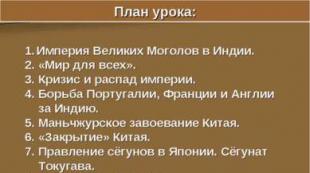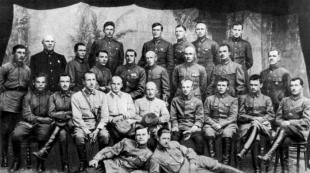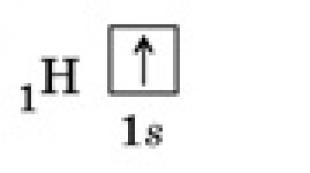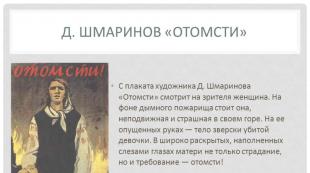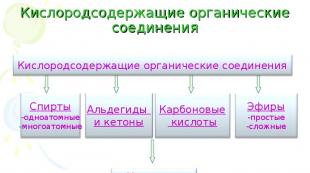Spelling grew up as a rule. Spelling of roots. In Russian
There are roots in which writing letters in place of unstressed vowels does not correspond to the general rule, but is subject to tradition. These include the following roots with alternating vowels.
1. Roots with letters a and o.
gar - mountains In place of the unstressed vowel the letter o is written, although under the stress - a, for example: burn, scorch, scorch, burn out, tanned, fire victim, combustible; But: soot, tan, soot, fumes. Exceptions (gar without accent): residue, dross, scorch, cinder(along with the cinder option).
zar-zor. In place of an unstressed vowel, a is written: dawn, lightning, glow, illuminate, illuminate, illumination, robin(bird), lightning; under stress - a and o, cf.: glow, radiant, radiant and dawn(plural of the word dawn), dawn, dawn, dawn, dawn(military signal, usually in the expression to beat or play dawn).
kas - kos. This root is written a if the root is followed by a; in other cases it is written about: cf. touch, touch, touch, touching, touching, but touch, touch, contact, inviolable(the vowel of the root does not occur under stress).
clan - clone. In place of an unstressed vowel, o is written, for example: bow down, bow down, bow down, bow down, bow down, bow down, bow down, bow down; under stress - o and a: cf. bow, incline, bend, inclined, adamant And bow, bow, bow.
speck - crop. The letter o is written without emphasis in words meaning “to cover with drops, splashes”: sprinkle, sprinkling(from sprinkle), sprinkle, sprinkled, sprinkle; the letter a - in words with the meaning “to cover with small specks, dots”: marked, marked(from drip meaning “to cover with specks, to apply specks”), inclusion. Under stress - only a: speck, speck, speck, intersperse, interspersed, speck.
lag - log - lie . In place of an unstressed vowel, a is written before g, and before z - o, for example: state, impose, assume, attach, decompose, urgent, delay, vagina, adjective, term, versifier, But: lay down, lay out, set aside, lay down, offer, attach, presentation, position, sentence, versification, cover, put aside. The emphasis is always on: tax, pledge, forgery, forged, put, put. In the word polog, where the root -log- is no longer distinguished in the modern language, o is written without stress before g.
pop - mok - moch . In place of the unstressed vowel, the letter a is written before k in words meaning “dip, immerse in liquid”: dip, dip, dip; letter o - in words meaning “get wet”: get wet, get wet, get wet, get wet(in the rain), in words derived from wet (e.g., wet, phlegm, phlegm, wood lice) (under stress - in words wet, get wet, get wet, get wet etc.), and in words with the meaning “to dry with something that absorbs moisture”: get wet, get wet, blotter, blotter. Before h there is always the letter o, for example: wet, soak, wet, soaked(cf. under emphasis: wets, soaked; about verbs in -ivat type wet, soak see § 34, note 2).
pay - sing (in the verb pay and words with the same root). A is written without accent: solder, solder, unsolder, soldering iron etc. Under stress - a and o: cf. sealed, sealing, soldering, soldered and solder, solder.
swim - swim. A is written without accent: floating, fin, floater, floater(grass; beetle; water possum), plover (beetle), phalarope (bird), float, floatable, afloat, floating; but: swimmer and swimmer with the letter o. Under stress - only a: swim, timber rafting.
Note. In a word quicksand(ground) letter is written s, as in other words derived from the verb float - float: float, float, blur and so on.
equal - equal The letter a is written in words related in meaning to the adjective equal “identical”, for example: equate (someone with someone), equal (something or with someone. ), equate, equalize, compare, comparison, equalize(in something), equalize (score), straighten, level out(for example, lines - “make equal in length”), equalize, equation, leveling, equal, equal, equal, balance, equinox, equal, equal.
The letter o is written in words related in meaning to the adjective “smooth, straight, without unevenness”, for example: level (bed, road surface), level out, level out, level out, level out(make it even, smooth, straight).
However, in words equally, same age related in meaning to equal, the letter o is written; in the word plain, related in meaning to even, there is the letter a. In words with an unclear relationship, the following is written: the letter a - in the verb to equal (in a line, during construction) and words derived from it equalize, equalize, level out(in service); the letter o - in combination the hour is not equal, in the word level.
different - different In numerous compound words with the first part diverse (various, versatile, discordant etc.) the letter a is written without stress, in the word separately - the letter o. Under the accent - a ( different, difference, vary) and about ( discord, discord, scattered).
ros(t) - ras(t) - rasch. In place of an unstressed vowel is written: a) before s (without subsequent t) - the letter o: grew, grew, grew, grown, thicket, overgrowth, algae, undergrowth; the exception is the industry and its derivatives ( sectoral, intersectoral, multi-sectoral); b) before st - the letter a, for example: grow, grow, grow, grow, grow, grow, grow, grow, germinate, grow, grow, increase, increase, age, plant, vegetation, wild; exceptions: sprout, growth, usurer, outgrowth, growth, outgrowth, outgrowth, sprout, teenage(along with the teenage option); c) before u always a, for example: grow, grow, grown, increase, build-up, fusion.
Under stress before s (with and without subsequent t) - only o, for example: growth, growth, outgrowth, teenager, overgrowth; grew, overgrown, grown up, tall, wild plants.
skak - skok - skok - skoch. If the root ends in k, then the letter a is written in place of the unstressed vowel, for example: gallop, gallop, gallop, gallop, skipping rope, galloping, galloping, galloping, although the emphasis is o, for example: jump, jump, bounce, jump, jump(for verbs in -ivat like jump, see § 34, note 2).
If the root ends in h, then the letter a is written in the forms of the verb to jump and verbs derived from it (for example: I'm galloping, galloping, galloping, galloping, galloping, galloping), as well as in the elephant there is a jump (the forms of the same verbs serve as a check - for example, gallop, let's gallop, and derivatives jump, gallop); letter o - in prefixed verbs with -skochit (for example: jump up, jump up, jump up, jump out, jump out, jump out, jump off, jump up) and in the word upstart (check - forms of the same verbs, except to jump out: jump up, jump off and so on.).
Wed: I'll skip (one hundred versts), skip it(verb forms gallop, gallop) And I'll pass, I'll pass(verb forms slip through, slip through); I'll jump, I'll jump(verb forms jump up, jump up approach at a gallop") and I'll jump, I'll jump(verb forms jump, jump"to quickly move closer to someone or to rise sharply").
creation - creature. In words create, creation, creator, created, create etc. the letter o is written without accent; under stress - not only about ( creative, creativity), but also a ( creature, created). In the word utensil, where the root -tvar- is no longer distinguished in modern language, a is written without emphasis.
2. Roots with letters i and e.
shine(k,t) - shine - shine. In place of the unstressed vowel, the letters i and e are written: i - before st with the subsequent stressed a, for example: shine, shines, brilliant, brilliance, resplendent, sparkle; e - in other cases, for example: shine, shine, brilliant, shining, sparkle, sparkle, sparkle, sparkle, reflection, sparkle, sparkle, sparkle, shine. Under stress - e and e: shine, glitter, shining; sparkle, sparkle, sparkle, glitter.
vis - weight. In place of the unstressed vowel, a letter is written in the verb hang (hang, hang) and its derivatives ( to hang, to hang etc.), as well as in prefixed verbs with the common part -hang: hang, hang, droop etc. (cf. under emphasis: hang, hang, hang); letter e - in words hang out, signboard, suspended, hinged, suspended(cf. under emphasis: hang, hang, hang).
lip-lep. In the words stick, stick, etc., the letter and is written in an unstressed position (cf. under stress: sticky, stick), and in words sculpt, stick, stick etc. - letter e (cf. under stress: sculpts, sticks, sculpting).
sid - se(d). In place of the unstressed vowel, the following are written: the letter i - before the soft consonant d - in the verb sit (sit, sit) and its derivatives ( sit, sit up, sitter, get-togethers and so on.); the letter e - before the hard d: rider, saddle (in the latter in the plural forms - e: saddles), saddle, seat, sciatic, sit, sit, press, squat, assessor, chairman, and also - before soft d - in derivatives from the word saddle ( saddle, saddle, saddle, saddle). Under stress - and and e, for example: sitting, imprisonment, diligent; sit down, sit down, village, homebody, fidget, hen, squat; in the forms of the verb sit and prefixes - also a (in writing i): I'll sit down, sit down, sit down.
Note 1. About writing vowels And And e in verbal roots with a fluent vowel, see § 36.
Note 2. In verbs with a common part -take(eg. borrow, pester, embrace, take away, lift, remove, understand, appease), which correspond to perfective verbs in -yum (take, accept, raise, understand, appease etc.), written after n in place of an unstressed vowel a letter And; same in verb take out(cf. owl view take out). In some verbs of this group, the unstressed vowel of the root can be checked by stress And in forms like take away, lift, remove(these are forms of verbs in -no), rarely - in derivative words: photo, in an embrace.
Note 3. Letter And in place of an unstressed vowel it is also written at the root of verbs conjure And curse. In the corresponding perfective verbs and other words with the same root, the letter is written (both in unstressed position and under stress) l: curse, curse, curse, damn, curse, curse and so on.
Safiullina Nuriya Akhmatovna, teacher of Russian language and literature MBOU "Osinovskaya gymnasium of the Zelenodolsk municipal district of the Republic of Tatarstan"
Lesson notes on Federal State Educational Standards in 5th grade.
Subject: Spelling of roots -RAST-, -RASH- and -ROS-.
Lesson type: mastering new knowledge.
Goals:
develop the skill of spelling vigilance and competent writing;
cultivate a desire to write beautifully and accurately.
- familiarization with the conditions for choosing the letters A-O in the roots –rast-, -rasch-, -ros-.
Formation of skills to correctly write these roots;
- formation of practical skills,
-develop the ability to logically express your thoughts.
- foster a culture of learning activities.
Personal UUD:
ability for self-assessment based on the criterion of success in educational activities.
Metasubject:
be able to determine and formulate a goal in a lesson with the help of a teacher;
be able to express your opinion based on working with the textbook material;
be able to work according to a collectively drawn up plan;
make the necessary adjustments to the action after its completion based on its assessment and taking into account the nature of the errors made;
plan your action in accordance with the task (Regulatory UUD);
be able to express your thoughts orally; listen and understand the speech of others; learn to work in pairs, formulate your own opinion and position. (Communicative UUD);
be able to navigate your knowledge system and textbook; find answers to questions using the textbook; your life experiences and information received in class. (Cognitive UUD).
Subject:
know the norms for the correct spelling of roots –rast-, -rasch-, -ros-.
know the conditions for choosing the letters O-A in the roots –rast-, -rasch-, -ros-.
Know exception words
Recognize words with alternating vowelsa - o in the roots -grow-, -grow-, -grew -;
justify the choice of vowels in these roots.
be able to apply acquired knowledge in practice,
be able to formulate in writing,
be able to indicate spelling No. 13.
Basic concepts:
spelling of roots –rast-, -rasch-, -ros-.
Interdisciplinary connections: Literature Resources: Basic: Russian language. 5th grade. Textbook in 2 parts. Authors: Ladyzhenskaya T.A., Baranov M.T., Trostentsova L.A. and others. Publisher: M.: Prosveshcheniye. Year: 2012.
Additional:
1. Bogdanova G.A. Lesson developments in the Russian language for the textbook by T.A. Ladyzhenskaya and others.Enlightenment, 2010.
2. L.T. Grigoryan, M.T. Baranova, T.A. Ladyzhenskaya, L.A. Trostentsova. Didactic material for the Russian language textbook. 5th grade: A manual for teachers.Publishing house:
Education.2009
Equipment: reference diagrams, tasks, algorithm of actions, test tasks, evaluation sheets
Activation means:
the living word of the teacher, TSO, practical work, independent work, individual assignment.
Forms of work in the lesson:
frontal survey, independent work, work in pairs.
Methods:
visual, verbal, reproductive, research, partially search,
Materials from the site http://www.razym.ru/naukaobraz were used
During the classes:
- Motivation for educational activities -
1.Organizational stage:
Dear Guys! Today we will take another step towards new knowledge. I am glad of your desire to learn the unknown.
2.Checking homework completion.
3.Preparing students for work at the main stage
What root spellings did we learn about in the last lesson? (spelling of roots –lag-, -false-.)
-Which section of the science of language are we going through (Morphemics. Spelling-What have we learned about the spelling of roots?
-What topic did we study in the last lesson? (The letters O-A in the roots –LAG-LOG-.
-Repetition of previous material. Insert the letters into the words: exposition (?) zhenie, pos- (?) live, sentence (?) adjective (?) adjective.
What is the algorithm for selecting the letters O-A in the roots –LAG-FALSE-?
Give examples of words using this spelling. Write them in your notebook. Indicate spelling number 12.
- Do you want to expand your knowledge about the spelling of various roots? (Yes.)
- Why do we need new knowledge? (To write correctly)
- What steps must be taken when acquiring new knowledge? (Two steps are required: find out what we know and don’t know).
- First, let’s find out by repeating what we know.
- Then we will try to complete the task for new knowledge.
“By analyzing its implementation, we will find out what we don’t know.”
- Let’s find out the cause of the difficulty: what we don’t know to complete the task.
- Let’s try to get out of the difficulty on our own, that is, to isolate new knowledge.
Updating previous knowledge.
4. Stage of assimilation of new knowledge and methods of action
Where do we begin to learn something new? (By repeating what we know on the topic: Dictation with elements of choosing the letters A or O. How can you do the work? - Divide the words into 2 columns: 1st if A is written, 2nd if O is written.
Purpose: to test students' ability to choose the correct option. The teacher dictates the words: adjectives, addendum, expound, offer, arrange, lay down.
Explain the conditions for choosing the letters A-O.
1. Now let’s look at the textbook table on page 34.
Read the assignment. Can you answer this question right away?
Let's build a project for getting out of the difficulty (goal, topic, method, plan, means).
5.Organizing the construction of a project to get out of a problem:
- Setting the goal of the project (the goal is always to eliminate the cause of the difficulty).
- Clarification and agreement on the topic of the lesson.
- Definition of tools (algorithms, models, reference books, etc.).
- Formulating the steps that need to be taken to achieve the goal.
Today we will get acquainted with a very important spelling in roots.
Try to formulate the topic of our lesson. (The letters O-A in the roots are RAST-ROS-)
What are the goals of the lesson: (learn to correctly write the letters A-O in the roots-rast-ros-).
How will we do this? (We will read and analyze)
-What method did we use in cases where we could not explain any spelling? (We usually used observation method).
Let's observe the spelling of words in this table.
- Now we need to find out in which case we will write the letter O in the roots –rast-, -rasch-, -ros-, and in which case the letter A.
-What method of action can be applied here?
Students' thoughts:
We see the roots in the 1st column -growth - The letters ST are highlighted here. This means that you need to write –A- at the root before ST. In the 2nd column the roots arerasch-, The letter –Sh- is highlighted, which means that before –Sh- you need to write the root –A-. In the 3rd column the letters are not highlighted, the root is written here-grown-.
Read spelling chart No. 13 on page 35 and draw your own conclusions.
6 . Application of knowledge and methods of action
Make a step-by-step algorithm for writing the letters A-O in the roots -RAST-, -RASH-, -ROS-.
Students: Step 1: read the word and see what the roots are. Step 2: see what letters are in the roots. Step 3: remember that before the letters ST you need to write A;. before the letters Ш you also need to write A. 4. You need to remember the exception words rO
drain, negativeA
sl.
- Let's read them again and remember them. Let's add the following exception words: PO
stov, RO
stislav, rO
stockist and remember them.
Let us express our conclusion in generalized form. Let's repeat the algorithm of actions all together.
Work in pairs: we pronounce exception words to each other one by one.
7.Primary check of understanding of what has been learned
Explain the condition for choosing vowels A-O-in roots with alternation:
Grows, grown, thickets, plant, algae. (student explanation)
8. Stage of consolidation of new knowledge and methods of action
Using an algorithm, explain how to choose the correct letter. After completing the work, carry out a mutual check. When checking each other, use a standard, i.e. spelling number 13.
Write down the words, insert the letter O or A, explain your choice: Beautiful r-sthenia, young por-sl, small r-drain, roses are bursting, boy R-stislav, growing cherries, sea algae, city of R-stov.
9. Application of knowledge and methods of action.
What is the next step in our cognitive activity? (It is necessary to consolidate knowledge of the rule and the ability to apply it in practice).
Organization of independent completion by students of standard tasks for a new way of action.
-Organization of correlation of work with a standard for self-test (in the case when students begin to master the procedure of competent self-control, it is possible to correlate work with a detailed sample).
Completing exercise No. 453. Write down in 2 columns words with roots 1) -rast- and rasch, 2) grew. Label the spelling you are studying. After completing the work, perform a self-test using standard spelling code No. 13.
10. Generalization and systematization.
Repetition of educational material: standard spelling No. 13.
In which row is the same letter missing in all words?After finishing the work, perform a mutual check using the standard spelling code No. 13.
A. 1. Modification, presentation.
2. Zar - if, adj.
3. Assumption, water.
IN. Read the text on the screen. Title the text. (Red Book of r-stenii).
Insert the letters and explain their spelling. Write down the words with missing letters.
How the beauty and aroma of wildflowers pleases us. But often greedy hands reach out to them and mercilessly tear them. These beautiful flowers and medicinal plants may disappear forever. Many of them are listed in the “Red Book of Republics”
11.Reflection of educational activities.
- What is the essence of spelling vowels in roots with alternating –RAST-, RASH-, -ROS-.
Have we achieved our goal?
What remains unclear and to whom?
! ! !
I learned to check the vowel in the root -RAST-, RASH-, -ROS- and I can explain the topic to a friend, I will say to myself: “Well done!”
12.Control and self-control of knowledge and methods of action
- Everyone answer the questionHave you learned everything well, have you succeeded?
13. Summing up the lesson
-What topic did we work on today?
- Let's remember what research we did today?
- Have all the questions been answered?
14.Homework
(three levels of homework)
- Remember how you worked in class today, did you learn everything well, did you succeed? Those who succeeded, take task No. 3, those who did not succeed, take task No. 2, and those who did not understand the topic of the lesson, take task No. 1.
1.Standard minimum - exercise 455: fill in the missing letters.
2. Advanced exercise 456: dictation; label roots with alternating vowels.
3. Creative: come up with a fairy tale about the kingdom of roots -GROW- and -ROS-.
-15.Grades for the lesson.
Thank you all very much for your work.
- growth tion,
- grow,
- grow up
- nurture
- increase
- age.
- grew up
- shoots,
- grown up
- thickets.
- ramp up,
- grow,
- cultivate.
Actually, according to the rule in this root with alternating unstressed vowels A written before -st- and -sch-: plant, grow, grow, grow. Exceptions: Rostok, Rostov, Rostislav.
Letter O written if there is no -st- and -sch-: grown, overgrown, overgrown. Exception: industry.
Spelling of vowels A and O in roots GROW - GROW and ROS.
The letter A must be written before the consonants ST and Ш, and before the consonant S we write the letter O.
For example,
grown - grown - grown - grown, grown - grown, etc. (we write the letter A, because before Shch),
plant, raised, raised, sprouted, age, age, grow up, etc. (we write the letter A, because before ST),
grown, outgrown, thickets, undergrowth, undergrowth, etc. (we write the letter O, because before C).
There are also exception words, the spelling of vowels in which you just need to remember, since they do not obey the rule above (see picture below):
Alternatively: plant, age
sprouted, grew
sprouted.
There are quite a lot of words with alternating vowels for the rule rast - ros - rasch in the Russian language. Known words
plant and age, but sprout.
The rule is simple; after careful reading and doing several exercises, determining which vowel to write will not be difficult.

Examples of words with the root RAST:
Melt, grow, grow, plant, age, grow, growing, grow, growth, vegetation, age.
Examples of words with the root ROS:
Thickets, grew, grew, grew, grew together, undergrowth, outgrown, grew.
Examples of words with the root RASH:
Splicing, growing, growing, building up, growing, grown.
In order not to get confused about which vowel to write in the root, remember the rule:
We write the vowel A before ST, Ш
We write the vowel O in other cases
There are exception words that you need to remember: moneylender, industry, rostok, Rostov, Rostislav.
Root -grow- in the following words: plant, age, increase, grow, increase, growing, wild-growing, grow, increasing, age, vegetation, grow..
Root -grew- in these words: thickets, grown, shoots, undergrowth, grew, grew up, grown up, outgrown...
Root -expand- in these words: building up, sprouting, splicing, growing, growing, grown...
Root -grow-
Grow-et, -growing, -growing, -growing, growing-silt - all words come from the word plant.
Root -grew-
Growing up, growing up, growing up, growing up, Rostov, growing up, growing up.
Root -expand-
to grow, to grow, to grow - all words come from the word grow.
The roots -rast- and -groves- refer to the rule of alternating vowels from -a-a to -o- and vice versa. The rule says: the letter -o- is written at the root of the word before all consonants, except -st- and -sch-sch. Before -st-, -sch- the letter -a- is written. From this rule two similar roots come, carrying the same meaning -ras-, -rast-, -groves-. Example: grow, grown.
Rast: grown, plant, age, grow, growing
Grew: tall, sprout, teenager, grown, thickets, overgrown
Grow: growing, growing, growing, growing, building up
Here are just some examples of words with these roots. Other words can be found on the Internet
It is not always possible to check the unstressed vowel at the root of a word. This cannot be done in the case of alternating vowels o//a, as, for example, at the root grow-/rasch-/ros-.
Examples of words with roots grow-/expand-:
plant, grow, grows, growing, will grow, plant growing, lush vegetation, vegetable oil, grow, grown beard, overgrow, properly grown, sprout in time, sprout, sprouted grain, grow up, grow up, the younger generation, grow, nurtured, grow, grow , growing, grow, grow, incremental, grow together, grow to the shelf, grow, grown.
Examples of words with the root ros-:
algae, algae, shoots, shoots, grew, grew, grew, grew, grew, grew, grew together, grew to the roof, grew quickly.
Let's remember the spelling exception words: sprout, industry, Rostov, Rostislav, usurer and derivative words - industry, sprout, sprout, sprout, teenage, usurer, Rostov, etc.
In the root with the spelling Alternating vowels in the root rast-// -ros-//-rash- the letter a is written before st, the letter o is written before s, the letter a is written before u.
Examples of words with roots - growth-
Examples of words with roots - grew up-
Examples of words with roots - rasch-
It is necessary to remember exceptions: sprout, outgrowth, moneylender, Rostov, Rostislav, industry.
rast - age,
rast - increase,
grow - grow,
grow - growing.
grew - thickets,
grew up - grew up,
grew - shoots,
grew up - grew up,
grew up - grown up.
rash - building up,
rasch - to germinate,
rasch - to splice,
Subject Russian language
Date 01/26/2009
Class 5 "B"
Lesson topic: “Spelling vowels A–O in the roots -GRAST-, -RASH-, -ROS”
Lesson type: explanation of the new.
Class level of readiness: average.
Lesson objectives:
Cognitive: get acquainted with spelling A–O in the roots -GROW-, -RASH-, -ROS
Practical:
improve the ability to correctly write words with these roots;
develop spelling vigilance;
General subject:
teach comparison, proof and refutation as methods of mental activity using the example of alternating vowels in roots;
develop the following operations of logical thinking: comparison, classification, analysis;
differentiated work on the stability of students' attention.
Principles of training: didactic:
scientific (teaching spelling based on generalizing spelling concepts).
accessibility (reliance on spelling knowledge acquired in primary school).
clarity (didactic material illustrating the concepts of writing, spelling, identifying features of spelling).
systematicity and consistency (use of system-forming concepts: type of spelling, identifying feature of spelling).
Methods of presenting knowledge: teacher's word with reproductive conversation.
Methods of knowledge generation: asking questions:
frontal survey (to consolidate new spelling concepts);
mutual interrogation (repetition of the writing rules A – O in the roots -GROW-, -GROW-, -ROS-).
Methods for developing skills:
finding roots with alternating vowels in sentences.
selection of examples of words with a given spelling.
selective distribution dictation.
Control methods: selective dictation with signal cards (used when summarizing the lesson).
Lesson plan.
1. Organizational moment – 1 min.
2. Mobilizing stage – 5 min.
3. Formulating the topic and purpose of the lesson – 5 min.
4. Studying new material – 8 min.
5. Consolidation of the studied material – 15 min.
6. Lesson summary – 2 min.
7. Setting homework – 2 min.
8. Reflection – 2 min.
DURING THE CLASSES
I. Organizational moment.
II. Mobilizing stage.
Target: prepare students to perceive new material.
The words are written on the board:
1) Offer, position, position;
2) Increment, ex..give, sex..live;
3) Submand..sentence, expression..sla.
Teacher. Read the rows of words out loud. Select the word in each row based on two characteristics at the same time. Read the words in the first row. Tell me, which word can be highlighted in it and why?
Students. In the 1st row you can highlight the word plants. This is a noun and the rest are verbs. In words offer, arrange -LAG-, -LOG-, and in the word plants - fundamentally -GROW-.
Teacher. Name the words of the 2nd row. Which word can be highlighted and why?
Students. In the 2nd row you can highlight the word increment . This is a noun, and the rest are verbs. In words set forth put the unstressed vowel is written in the roots -LAG-, -FALSE-. In a word increment fundamentally -RASH-.
Teacher. What can you say about the words in the third row?
Students. Among the words of the 3rd row one can single out the word grew . This is a verb, and the rest are a noun. In words term, offer the unstressed vowel is written in the roots -LAG-, -FALSE-. In a word grew - fundamentally -ROS-.
III. Formulating the topic and purpose of the lesson.
Target: learn to formulate the topic and goals of the lesson.
Teacher. Name the words highlighted from each row. Tell me which vowels and in which part of the word are missing. State the topic of today's lesson.
Students. We have highlighted the words plants, increment , grew. The vowels in the roots of these words are missing ABOUT or A. So, the topic of today's lesson is “ Vowels -A – O in the root -RAST-, -RASH-, -ROS-“.
The teacher writes the topic of the lesson on the board.
Teacher. Formulate the purpose of the lesson based on its topic. Use the writing on the board.
1. Get acquainted...
2. Learn to find and write correctly...
Students. Purpose of the lesson: get acquainted with the rule of writing vowels A And ABOUT in the roots -GRAST-, -RASH-, -ROS-; learn to find and correctly write words with these roots.
IV. Learning new material.
Target: find out the conditions for writing the roots being studied.
1. Working with the textbook, p. 169.
Teacher. What does vowel alternation depend on? A – O in the roots -GROW-, -GROW-, -ROS-?
The rule is repeated by 2 - 3 students.
2. Entry in the “Dictionary of Difficult Words”: Rostov, sprout , industry , Rostislav.
V. Consolidation of the studied material.
Target: consolidate the acquired knowledge.
1. Exercise 437 (oral)
2. Selective distribution dictation.
Plant leaves, young shoots, rose sprout, flowers growing, ancient industry, seaweed, potato growing, reed thickets.
3. Exercise (writing on the board)
1) grow..style, age..st, ...
2) fusion, grown, ...
3) rise..s, water..sli, ...
Reference: growing up, matured, matured, inferior, mature
Teacher. Read the strings of words. Formulate a task for them. (You need to continue the chain of words using words from the help)
Teacher. Name the signs according to which it is necessary to continue the chain of words. (These chains of words must be continued, taking into account which vowel is written at the root)
Teacher. What word can be included in the first chain? Write this word down. Explain the placement of the letter A at the root of the word.
Students complete the assignment and check it with the teacher. They work in a similar way with the rest of the word chains.
4. Selective dictation.
1) Play, children, grow up in freedom. (N. Nekrasov)
2) Three proud palm trees grew high. (M. Lermontov)
3) Thickets of bushes formed an impenetrable thicket.
4) Rice grows in swampy places.
5) The seashore is covered with algae.
6) These places surprise with their rich vegetation.
5. Work in notebooks with a printed base. (test 11, task 4)
VI. Lesson summary.
Teacher. What rule did we learn about in class today?
Children repeat the rule. The teacher evaluates the students' work in class.
VII. Homework . Paragraph 84, ex.441.
VIII . Reflection
What new did you learn in the lesson?
How?
What else needs to be done?
Please describe your activities in class and the degree to which you have mastered the material (+).
Okay Got it, but
I didn't understand everything.
material.
Active In class
it was working
at the lesson. boring.
Thank you for your work, grades for the lesson...
The letters O-A in the root -rast-//-ros-//-rasch-
Lesson type: learning new material
Forms of organizing educational activities in the classroom: individual, pair, frontal.
Lesson objectives:
Cognitive aspect: analyze cases of alternation of vowels o-a in the root - ras- // -ros-//-rasch-; teach to recognize words with alternating vowels at the root, justify the choice of vowels;
Developmental aspect: develop speech, attention, memory, logical thinking, the ability to generalize, draw conclusions, develop self-control skills;
Educational aspect: improving the skills of ethical interpersonal communication, cultivating a careful attitude to the word.
Equipment:
interactive board, , , cards for testing, textbook (Russian language: textbook for 5th grade general educational institutions / [T.A. Ladyzhenskaya, M.T. Baranov, L.A. Trostentsova, etc.] - 35th ed. - M.: Education, 2008.)
DURING THE CLASSES
№ slide
Lesson steps
Slide 1
1. Organizational moment
2. Recording the topic of the lesson, setting goals
3. Updating knowledge.
Frontal survey
- What is alternation?
- Give examples with alternating sounds in prefixes, roots, suffixes
- Tell us about the spelling of alternating vowels in the root -lag-// - false-
Slide 2
Verification work
Fill in the missing letters
offer a draw
magazine supplement
popular expression
state of affairs
rely on the team
decompose...live plants
outline the program
st...live in seconds
exc…live visit
hold...live responsibility
have data
make an effort
Slide 3
4. Explanation of new material
4.1. Observations on the table, formulation of the conclusion
Slide 4
4.2. We compare the conclusions with the rule in the textbook, paragraph 85
Slides 5-9
4.3. Lexico-spelling work. Write down the exception words. Why are they exceptions?
Slide 10
5. Consolidation
5.1 Development of oral speech. Read the tongue twister several times, explain the spelling of the words
The sap...sprouted, they grew, but the s...sprouts did not grow.
Slide 11
5.2.Independent work exercise 437.
One student works at the computer (pause mode), the rest in pairs.
Cherry grew, grew taller, and finally grew up; saved the growth; a garden grown by schoolchildren; small river.
Checking, error analysis
Slide 12
5.3. Construction. Make up word combinations based on the picture with the root –rast- // -ros-//-rasch-
Slide 13 or interactive task
5.4. Distributive dictation. Interactive task
Composition, expression...styles, make...efforts, sub...sli, growth...sti, st...live, v...sli, iz...gat, r...drain, grown, branch...sl, r...storer, r...sthenia
By what principle can words be divided into groups?
Slide 14
6. Summing up the lesson
- What spelling did you study?
- What determines the choice of vowels in the root -rast- -ros- -rasch-?
- What are the exception words?
- What are the similarities between the rules about the spelling of roots -rast- //-ros- // -rasch- and -lag- // -lozh-
Slide 15
7. Homework
learn paragraph 85, repeat exercise 441, paragraph 84
Website development 2007-2010 © (Impression counter: 1492651)
When using site materials in full or in part, a link to the site is required.
